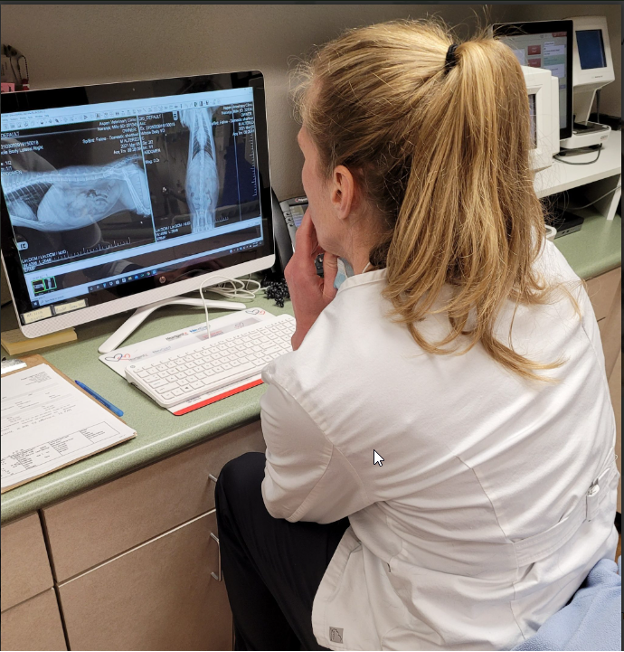Just like humans, pets can experience health issues that require diagnostic testing. From blood tests to imaging scans, various diagnostic tests are available for pets. In this guide, we’ll explore the different types of tests and how they work to help keep your furry friends healthy.
Physical Exam
Physical examinations are an essential diagnostic tool veterinarians use determine the current health status of your pet. During a physical exam, our doctors look for signs such as rapid breathing, activity level, appetite or hydration levels, and abnormalities related to the skin or coat. Regular physical exams can help us identify potentially serious problems before they become too advanced.
Blood Tests
Blood tests are one of the most common types of diagnostic tests used for pets. They can reveal a lot about your pet’s health, including their organ function, blood sugar levels, and potential infections. A blood sample is taken from your pet and sent to our laboratory for analysis. The results can help us diagnose and treat whatever health issues your pet may be experiencing. Blood tests can detect diseases such as:
- Diabetes
- Kidney disease
- Anemia (low red blood cells)
- If your pet is fighting an infection
- Blood clotting disorders (unexplained bleeding)
Pre-anesthetic Bloodwork
Pre-anesthetic screening reduces risks and increases the quality of care by identifying pre-existing medical conditions and potential difficulties that could arise while a pet is under anesthesia. Bloodwork before surgery also gives the doctor a chance to alter their typical drug protocol for sedation and anesthesia to a combination of different medications that are safer for your specific cat or dog. Every drug has possible side effects, and we want the best outcome for your pet.
Urine Tests
Urine tests are another common type of diagnostic test used for pets. They can provide valuable information about your pet’s kidney and bladder health, including the presence of infections, crystals, or other abnormalities. A urine sample is collected from your pet and analyzed in a laboratory. Your veterinarian may also perform a urinalysis, which involves examining the physical and chemical properties of the urine. This can help diagnose and treat any urinary tract issues your pet may be experiencing.
Pet Diagnostic Imaging
Veterinary diagnostic imaging allows us to evaluate your pet and diagnose some medical conditions non-invasively. Our clinic can do X-rays, ultrasounds, and digital dental X-rays.
We use X-rays to evaluate a pet’s bone structure, heart, lungs, abdominal organs, and reproductive and urinary systems. We can identify broken bones or foreign bodies through X-rays and diagnose cancer or tumors.
An ultrasound uses sound waves to examine specific internal organs. We can also use ultrasounds to detect animal pregnancy after 35 days of gestation. Ultrasound images are in real-time and therefore show the structure and movement of the body’s internal organs and blood flowing through blood vessels. We can perform ultrasound imaging using minimal restraint or sedation.
An ultrasound uses sound waves to examine specific internal organs. We can also use ultrasounds to detect animal pregnancy after 35 days of gestation. Ultrasound images are in real-time and therefore show the structure and movement of the body’s internal organs and blood flowing through blood vessels. We can perform ultrasound imaging using minimal restraint or sedation.
Fecal Testing
Fecal tests detect the presence of parasites. We use a sample of your pet’s poop for a microscopic examination to detect parasites. In many cases, symptoms of parasite infection may be mild or nonexistent, which is why fecal testing is so important. Also, different parasites can cause similar symptoms, and isolating the type of parasite is essential.
Heartworm Testing
Our blog, Heartworm Prevention, explains what heartworm is, how we treat it, and how to prevent your pet from getting heartworm. If we suspect your pet has heartworm disease, we will suggest a heartworm test. The test requires just a tiny blood sample from your pet, and it works by detecting the presence of heartworm proteins. In some cases, if your pet tests positive, we may recommend further tests.
Allergy Testing
Veterinarians use allergy tests to identify and diagnose allergies that may affect your pet. The tests are either skin or blood tests and can help us determine what potential allergens trigger a reaction in your pet. Common allergens include dust, pollen, molds, and insect stings. Treatments may include medications like anti-inflammatories or immunotherapy shots. Allergy testing can also help identify environmental allergens you can remove from your home.
Aspen’s In-House Laboratory for Pet Diagnostic Tests
Aspen Vet offers the latest state-of-the-art in house laboratory analyzers to diagnose and monitor your pet’s health. Our in-house laboratory includes:
- Hematology Analyzer-Complete Blood cell Count, hemoglobin levels, platelet count
- Chemistry Analyzer-liver enzymes, kidney markers, early kidney disease detection, electrolytes, protein levels, diabetes screening, thyroid testing
- Automated Urine Analyzer
- Fecal Flotation
- Heartworm test
- FIV/FeLV test for feline retroviral disease
- Microbiology-culture incubator for bacterial infections such as skin infections and bladder infections.
- Cytology evaluation of skin cancers, ear infections, masses, joint fluid, body cavity effusions, skin parasites
We use Idexx Laboratories as our outside referral laboratory for advanced testing or specialized blood panels. Hundreds of species-specific and disease-specific tests are available to diagnose medical problems and monitor treatment response accurately.
Routine vs. Emergency Pet Diagnostic Tests
When you bring your pet in for a checkup, our doctors may recommend specific tests or treatments if your pet is experiencing any symptoms and to ensure your pet is in the best possible health. Some tests, such as heartworm tests, are performed yearly to ensure your pet is disease free. Yearly blood tests may become necessary as your pet ages into its senior years. Catching problems before they become severe will help reduce the total expense of owning and caring for your pet and help your pet to have a long and happy life.
In an emergency, our priority is to stabilize your pet as much as possible, whether we need to administer CPR, fluids, pain medication, etc., to lessen the severity of the emergency. Once we have stabilized your pet as much as possible, we may need to perform diagnostic testing to help us determine the cause of the crisis to move forward in treating your pet.
Summary
Diagnostic testing lets us get a clear picture of what’s happening inside your pet’s body so that we can provide the best possible treatment. It can also help identify potential health problems before they become more serious. And diagnostic testing helps ensure that any medications or treatments we prescribe are doing their job and not causing harmful side effects.
Sincerely,
Your Friendly Team at
Aspen Veterinary Clinic

